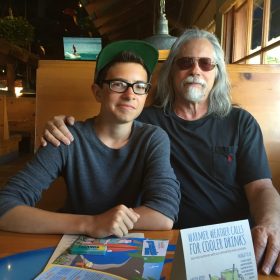What was your dissertation title and topic?
Time, Tense, and Temporal Becoming: A Study of Temporal Reference and Metaphysics
What seminar stood out and influenced your thinking?
None in particular; I learned things of value from all of them.
Do you have a good story or two about the department?
The funny things I remember were little things.
A Shot of Courage – I was so nervous on my first day as a teaching assistant that I took a thermos of rum and pineapple juice to campus with me and downed it in the hour before my first section met. The students in that section were great, I had the best time of my life, and never needed another shot of courage.
Cigarette Man – Anyone who remembers Rogers Albritton will recall that he smoked like a chimney. In a Wittgenstein seminar one day, he was smoking and gesticulating wildly, really into what he was discussing. He put the cigarette that he’d just lit into an ashtray, talked for moment, then lit another. He took a drag, put that cigarette into the ashtray, which now held two burning cigarettes, and lit a third. With that third one in his mouth, he picked up one from the ashtray. One in his hand, one in his mouth, one in the ashtray.
The paper eater – In Tyler Burge’s Philosophy of Language Seminar, I sat next to someone who I did not know and don’t recall being a philosophy grad student. One day, as lunch time approached, I watched this student tear off a corner of a piece of lined paper and put it in his mouth and swallow it. I then watched, in something approaching awe, as he proceeded to devour an entire piece of paper. I finally slapped him on his arm and suggested that if he were that hungry he should excuse himself from class and grab some real food. He told me that he’d had no idea at all that he’d eaten the paper.
What, if anything, about the UCLA department’s culture and approach to philosophy has influenced your intellectual approach?
Rigor and the refusal to abandon analytic philosophy.
How have your philosophical interests changed since you were at UCLA?
I became interested in History of Philosophy through teaching a History of the Philosophy of Mind course. I published a couple of papers on Descartes as a result. Also, as a visiting professor one year, I was asked to teach Ethics, a subject in which I previously had only a passing interest. I became convinced that the history of Ethics was riddled with false dichotomies and dysfunctional models and developed these views, at least to my own satisfaction, over a number of years.
If your current career is outside of academia, have you found your philosophical training useful and if so, in what way?
I’m retired, but my son (see picture) has shown a strong interest in philosophy. He was chosen to participate in a summer philosophy program at a local university and I encourage him to think like an analytic philosopher. It’s pretty remarkable to have philosophical discussions with one’s son.


